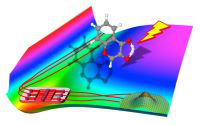This pages hosts links to recordings of the lectures;
Week 2:
September 12
14:40-15:50 Julia Westermayr Machine learning for excited-state molecular dynamics
16:00-17:00 Max Pinheiro Jr Unraveling patterns in nonadiabatic molecular dynamics data with machine learning [b] [v]
September 13
10:00-11:00 Basile Herzog Solving the Schrödinger equation in the configuration space with generative machine learning [a] [v]
11:00-12:00 Nicolas Sisourat Speeding-up quantum chemistry, and thus quantum molecular dynamics, with machine learning [a] [v]
14:00-15:00 Jan Hermann Neural-network wave functions for quantum chemistry
15:15-16:15 Anatole von Lilenfeld Neural-network wave functions for quantum chemistry [a]
September 14
10:00-11:00 Thomas Bucko MLPT- an effective method for determining free energies at multiple electronic structure levels
11:00-12:00 Julien Lam Observing the birth of crystals using machine-learning assisted simulations [video starts at 55:09]
14:00-15:00 Reinhard Maurer Machine learning of structure for dynamics at surfaces [b] [v]
15:15-16:15 Mario Barbatti Nonadiabatic dynamics in the long timescale: the next challenge in computational photochemistry [c] [v]
September 15
8:45-9:45 Pavlo Dral Accelerating and improving quantum chemistry and dynamics with machine learning [part 1] [part 2] [v1] [v2]
10:00-11:00 Daniel Pelaez-Ruiz Analytical low-rank representation of high-dimensional tensors : Applications to Tucker and Canonical polyadic forms [a] [v]
11:00-12:00 Nada Doslic Progress and Challenges in Modelling Photoinduced Processes
14:00-15:00 Michele Ceriotti Full quantum (thermo)dynamics with integrated machine learning models [a] [v]
15:15-16:15 Jean-Philip Piquemal Machine learning and molecular simulations: from many-bodydispersion to free energies [a] [v]
September 16
8:45-9:45 Milica Todorovic Computational materials engineering with active learning [a] [v]
10:00-11:00 Bastien Casier FCInet: an iterative machine learning classification neural network for a smartly machine selective CI [a] [v]
11:00-12:00 Andrea Grisafi Predicting electronic structure properties with equivariant and long-range machine-learning methods
Week 3
September 19
10:10-11:00 Michael Marthaler Simulating open quantum systems with quantum computers [a] [v]
11:00-11:50 Ada Warren ADAPTive variational quantum algorithms for Gibbs state preparation [a] [v]
14:00-14:50 David Munoz Ramo Using molecular symmetries to perform quantum simulations on current hardware [a] [v]
15:10-16:00 Victor Alessandrini Quantum computing emulation [a] [v]
September 20
9:50-10:40 Matthias Degroote Efficient quantum computation of molecular forces and other energy gradients [a][v]
11:00-11:50 Benjamin Lasorgne Quantum dynamics on quantum computers: where do we stand, where may we go ? [a] [v]
14:00-14:50 Ivan Rungger Green's functions algorithms on quantum computers for materials science [a] [v]
15:10-16:00 Giulia Galli Quantum embedding methods for simulations of materials on quantum computers [a]
September 21
11:00-11:50 Rick van Bijnen Variational Quentum Optimization algorithms [a] [v]
September 22
9:50-11:40 Francesco Evangelista Projective quatum algorithms for quantum chemistry [a] [v]
11:00-11:50 Bruno Seanjean Towards Density Functional Theory on quantum computers
14:00-14:50 Martin Beseda Quentum dynamics with state-averaged VQE in noisy environment [a] [v]
14:50-15:40 Matthieu Saubanère Alternatives to unitary coupled cluster Ansatz for variational quantum eigensolver
September 23
9:00-9:50 Giuseppe Carleo Variational learning in the age of machine learning and quantum computing
10:10-11:00 Thomas Ayral Quantifying quantum advantage through high-performance classical simulations: two examples [a] [v]
11:00-11:50 Adam Smith Topology on quantum computers [a] [v]
Week 4
September 26
9:40-10:10 Fabien Gatti Quantum Dynamics with motions of large amplitude [a]
10:10-10:40 Grégoire Guillon Dynamics in dilute media: quantum clusters & molecular encounters- How may Al help circumvent roadbloks ? [a] [v]
11:00-11:30 Dominique Sugny Quantum control in Molecular dynamics: Application to molecular rotation and quantum technologies [a]
11:30-12:00 Ioan Schneider Etudes théoriques des collisions électron/cation moléculaires à basse énergie [a] [v]
14:00-14:40 Bruno Senjean Quantum computing applied to quantum chemistry [a] [v]
15:00-15:30 Lei Shi Quantum dynamic simulation for H atom scattering from graphene surface [a]
15:30-16:00 Aliezer Martinez-Mesa Hydrogen storage in nanoporous materials [a] [v]
September 27
11:20-12:00 Roberto Marquart Dynamique quantique de la diffusion thermique d'adsorbats [a] [v]
15:40:16:20 Christophe Tremblay Stochastic dissipative quantum dynamics [a] [v]
September 28
10:00-10:40 Mathias Rapacioli Some developments for DFTB dynamics and PES [a] [v]
11:30-12:00 Llinersy Uranga-Pina Quantum trajectory modeling of utrafast molecular dynamics [a] [v]
14:00-14:40 Majdi Hochlaf Towards the identification of middle size molecular ions in the gaz phase: theory, applications and experiment [a]
15:00-15:30 Alejandro Riveri Santamaria High-Dimensional atomistic neural network potentials to study gas-surface interactions. Study case: O2 scattering from highly otiented pyrolitic graphite [a] [v]
15:30-16:00 Amrenda Pradey Calculations of atomic and molecular properties of Rb for ultracold molecule collisions [a]
September 29
9:40-10:20 Stefan Willitsch Cold molecular ions in traps: from molecular quantum technologies tp precise mechanistic studies of chemical reactions [a]
11:20-12:00 Nadine Halberstadt Dynamique de dopants dans un environnement très quantique, les nanogouttes d'hélium superfluide [a] [v]
14:00-14:40 Lucien Dupuy Multidimensional tunneling from an hybrid quantum-classical trajectory approach [a] [v]
15:00-15:30 Natasa Nadoveza Analytical high-dimensional operators in canonical polyacid finite basis representation (CP-FBR) [a] [v]
16:00-17:30 Concluding remarks [a]

